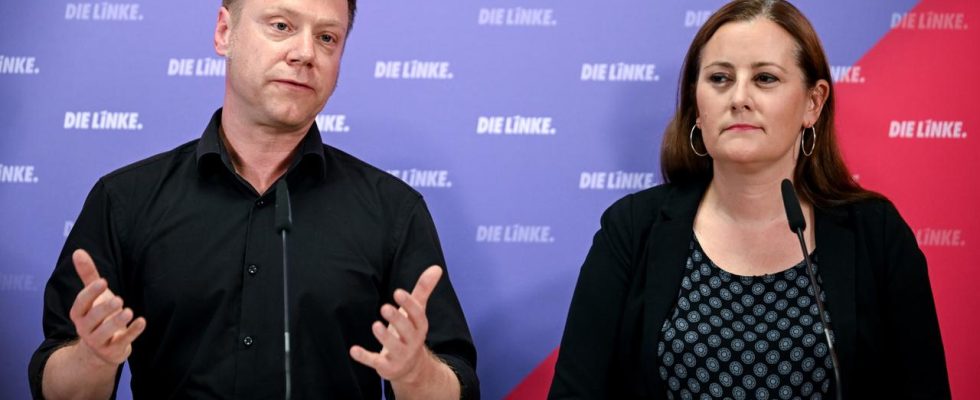analysis
The Left has now also missed the five percent hurdle in Hesse and again in Bavaria. Now the party is looking for causes. On the one hand, there is the hiccup surrounding Wagenknecht – but there are also other construction sites.
The state elections in Bavaria and Hesse have become an expected debacle for the left. In both countries the party failed at the five percent hurdle. This means that the Left is now only represented in two West German parliaments – although this does not include a single regional state. Only two city states remain: Hamburg and Bremen. The dream of an all-German party now seems to be over.
Even in the West, the Left is not lacking in topics with which it could score points with voters. Rising rents, high energy costs, inflation – the social question also arises in western German countries and not just in the big cities. There is also a lack of teachers and daycare places, which mostly affects children from poor families. But the left is obviously no longer associated with any of these issues.
In Hesse, only seven percent of voters believe that the Left has skills in the area of social justice. In Bavaria it is only five percent. For a party that sees itself as an advocate for the “little people,” this is a declaration of bankruptcy. Instead, the impression among voters is that the left is primarily concerned with itself.
Always a car driver
The reason for this is the dispute over Sahra Wagenknecht that has been going on for years and the speculation that she could found a new party. The two party leaders Janine Wissler and Martin Schirdewan had hoped to resolve the problem through a board decision. But the attempt to declare the prominent left-wing party persona non grata and to get them to withdraw from the party failed. Also because Wagenknecht didn’t react to it and the party leadership didn’t draw any further conclusions from it.
Instead, Wagenknecht continues to sit for the Left in the Bundestag – even if she is more conspicuous by her absence there. She enjoys even more public attention, is a popular talk show guest and repeatedly fuels speculation about founding her own party.
Final line through Exclusion from the party?
The fact that a group of more than 50 party members from several state associations has had enough and wants to draw a line under the Wagenknecht chapter with a party expulsion process almost seems like the courage of desperation. This step would have been conceivable earlier, says one of the initiators. But attempts were made to keep the issue out of the state elections in Hesse and Bavaria. However, it was of no use.
Wissler and Schirdewan wanted to avoid expulsion proceedings against Wagenknecht. The reason given was that it was too lengthy and too much distraction from the work. Instead, the hope that Wagenknecht would eventually abandon their plans prevailed. You could hear again and again from party representatives that they did not believe in founding a new party because Wagenknecht lacked supporters and the effort would be too great.
The Left also fears for the existence of its parliamentary group. This could lose its status if Wagenknecht was kicked out if two other people left the faction alongside her. A parliamentary group must have 37 members, the Left currently has 39.
After the Saarland Bundestag member Thomas Lutze announced at the weekend that he wanted to leave the Left and switch to the SPD parliamentary group, all that would be needed besides Wagenknecht is one more MP. The loss of parliamentary group status would also mean a loss of influence, employees and money for the left.
Problems in the area
The fact that the party primarily has a problem in the area – this realization now seems to have also matured in the Berlin headquarters. In Hesse, for example, seven percent of voters in large cities still voted for the Left. In small communities, however, it was just two percent.
Party leader Schirdewan now wants to turn things around with a “member offensive”. The left should be more widely represented and reach people directly.
The party still has a little time until the European elections and the state elections in Brandenburg, Thuringia and Saxony next year. However, the starting position for the left would probably not improve much if Wagenknecht actually got serious. In surveys, up to 20 percent of voters can imagine voting for a Wagenknecht party. There are even more in the east. She gets the most support from supporters of the left.

